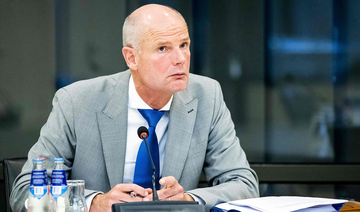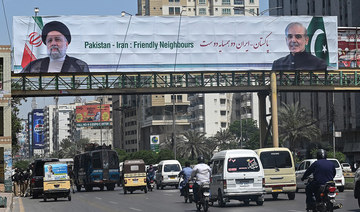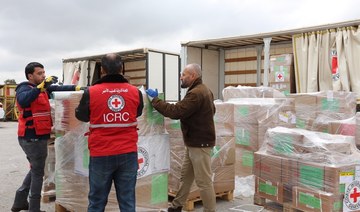NEW YORK: The atmosphere in the UN Security Council changed when human rights activist and survivor of Assad regime prisons Omar Alshogre began to talk. Monday’s meeting had been convened to shed light on the prevailing impunity in Syria and the need for the council to do more to end it and ensure accountability for crimes committed during the country’s ongoing war.
The conflict began when the regime launched a brutal crackdown on peaceful protesters during the “Damascus Spring.” Since then, more than 350,000 people have died and millions more forced from their homes.
Alshogre, whose harrowing experiences as a political prisoner in Bashar Assad’s jails — “being detained, starved, tortured within an inch of my life” — had made the news worldwide, looked the representatives of world powers in the eye in the UNSC chamber and asked them: “If you were presented with the opportunity to save an innocent life without risking your own, would you do it? Most people would.”
“Ladies and gentlemen,” the 25-year-old refugee continued. “The opportunity is presenting itself today. It presented itself yesterday, and every day since March 15, 2011. That is 3,912 missed opportunities to save lives in Syria. In that time, more than 350,000 people have been killed by the Syrian regime, according to the UN.”
The informal meeting was convened by council members Estonia, France, the UK and the US, along with a dozen sponsors including Qatar and Turkey.
Alshogre told the ambassadors that it was his own mother’s “courage to stand up to the brutal dictatorship” that saved his life and urged them to remember her name, “Hala,” and follow her example.
Despite her husband and sons being massacred in front of her eyes by Assad’s men and their “Iranian allies,” and “instead of complaining about her limitations, (my mother) found a way to take action.
“Despite many failed attempts to get me out of prison, she kept trying again and again. She persisted until I was freed,” Alshogre said.
“By saving me from prison, my mother set an example of how we all must act to stop the Syrian regime from taking more lives and hold its leaders accountable for the countless lives it has already taken.
“It doesn’t require a miracle. It just requires courage, action and persistence.”
A recent report by the UN’s Independent International Commission of Inquiry on the Syrian Arab Republic concluded that thousands of detainees have been subjected to “unimaginable suffering” during the war, including torture, death and sexual violence against women, girls and boys.
The UNSC had tasked the commission with investigating and recording all violations of international law since the start of the conflict.
“At least 20 different, horrific methods of torture used by the government of Syria have been extensively documented,” the investigators wrote in their report.
“These include administering electric shocks, the burning of body parts, pulling of nails and teeth, mock executions, folding detainees into a car tire, and crucifying or suspending individuals from one or two limbs for prolonged periods, often in combination with severe beating.”
The perpetrators, however, still roam freely in Syria amid no tangible deterrence, as violations and crimes continue to this day.
The sentencing by a German court in Koblenz in February of former Syrian secret agent Eyad Al-Gharib to four and a half years in prison on charges of aiding and abetting crimes against humanity has been hailed as historic.
Al-Gharib had been accused of rounding up peaceful anti-government protesters and delivering them to a detention center, where they were tortured. The verdict marked the first time a court outside Syria had ruled on state-sponsored torture by members of the Assad regime.
Christoph Heusgen, Germany’s former permanent representative to the UN, said the verdict of the Koblenz state court sends a clear message to Assad that “whoever commits such crimes cannot be safe anywhere.” He added that “Assad’s state has turned the cradle of civilization into a torture chamber.”
Teams from war crimes units in Sweden, France and Germany have recently begun joint investigations into Syria’s war crimes, with Sweden focusing on torture and killings by both the Assad regime and Daesh.
In France, a preliminary investigation has drawn on the tens of thousands of photos of dead bodies taken between 2011 and 2013 by “Caesar,” the codename for a former Syrian military photographer.
While speakers at Monday’s meeting welcomed similar proceedings in courts outside of Syria, they said that such moves “do not come close to addressing the magnitude of the Syrian crisis.”
They lamented the UNSC’s inaction and the fate of its 2014 resolution to refer the situation in Syria to the International Criminal Court, which was not approved.
“Several resolutions aimed at identifying those responsible for the use of chemical weapons met the same fate,” said the meeting’s sponsors in a statement. They reiterated their call for the file to be placed in the hands of the ICC.
As Syrian filmmaker Waad Al-Kateab, who also gave heart-wrenching testimony about life under Assad, played a video in the chamber showing an Aleppo mother at the moment she lost her child in an Assad bombing, some council members choked back tears.
Alshogre said: “We have stronger evidence today than what we had against the Nazis at Nuremberg. (We) even know where the mass graves are located. But still no international court and no end to the ongoing slaughter for the civilians in Syria.
“I understand that there are barriers to action, but I also believe in the international system and the UN and the principles they were founded upon.”
Alshogre made a final plea to the international community that, while it is too late to save those who died, there are millions of Syrian lives that can still be saved and “that is my biggest ask to you: That you save them.”



























